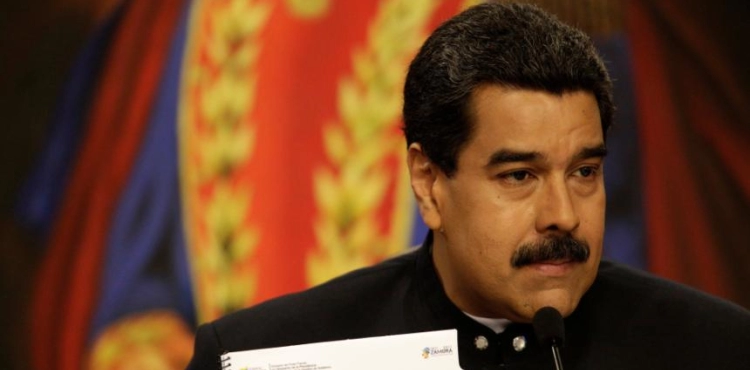The Venezuelan government on Sunday expelled five European deputies in a move described by opposition leader Juan Guido as "irrational", while the confrontation between him and President Nicolas Maduro over the arrival of international aid has intensified.
The Spanish MP, who headed the delegation Esteban Gonzalez Ponce, said the members of the European Parliament were expelled without any explanation.
"We are being expelled from Venezuela, our passports have been confiscated and we have not been informed of the reason for the expulsion," he said.
The incident is the latest in a series of tensions between the international community and Maduro, who is in a power struggle against Guido, the speaker of parliament who declared himself acting president last month.
Guido is supported by more than 50 countries, 30 of them in Europe.
Ponce is accompanied by his compatriots Ignacio Salafranca, Gabriel Mato Adrover, Dutchman Esther de Lang and Portuguese Paolo Rangel, all members of the conservative European People´s Party.
Guido commented on the move in a tweet on Twitter. He said the group had been expelled by "an isolated regime that is becoming more and more irrational."
Earlier on Sunday, Guido said he was seeking to mobilize a million volunteers within a week to counter the government´s decision to block tons of aid, mostly from the United States, from entering the country, where residents are suffering from food shortages and say they are dying from lack of medicines.
Guido on Saturday, a month after announcing himself as acting president, set a date for Maduro´s aid response.
Food, health supplies and food supplements were packed near the Venezuelan border in the Colombian city of Cucuta.
Additional stores are expected to open this week in Brazil and Curacao, the island of the Netherlands, located in the Caribbean off the coast of northern Venezuela.
"Our primary mission is to reach one million volunteers by February 23," Guido said in a letter to the 600,000 supporters who have so far joined the targeted move.
He stressed that volunteers will gather at specific points or participate through social media.
Volunteer buses will be carried to border points where they will receive and transport the cargo. Guido did not say how he intended to bypass border barriers set up by the Venezuelan army on orders from Maduro.
Groups of volunteers began meeting in "humanitarian camps" in several Venezuelan states to organize and prepare for the arrival of aid. Doctors and nurses sometimes work under umbrellas or treatment tents for residents.
The collapse of the economy has prompted an estimated 2.3 million Venezuelans to migrate from the oil-rich country. Those who have survived are suffering from the huge inflation that has made access to food and medicine difficult for many as a result of the scarcity of these essentials.
Maduro, who denies the existence of a humanitarian crisis in his country, considers the movements of the opposition a "political review" and a cover for an American invasion.
"Venezuela is preparing to receive large amounts of humanitarian aid," Guido told about 4,000 supporters dressed in white shirts and green scarves and gathered on Saturday to register as volunteers.
Among those who offered their help were Andrea Hernandez, a physiotherapist and her mother, as a pediatric nurse. Hernandez said her mother "cried (repeatedly) to see her patients die of lack of medication."
"That is why humanitarian assistance is the best (what can be done) to Venezuela at this time," she said.
US Senator Marco Rubio arrived in Cucuta Sunday for relief operations. He met officials at an aid gathering point and visited the Simon Bolivar International Bridge linking Venezuela to Colombia.
"Whoever prevents the entry of humanitarian aid will have the fate of spending the rest of his life fleeing international justice because that is an international crime," Rubio said.
Three US cargo planes brought in additional tens of tons of food aid to Kakota on Saturday.
Another US aircraft is expected to arrive in Curaçao from Miami on Tuesday and a center for Brazilian assistance will be opened Monday at the border, the Guido team said.
The Venezuelan community moved in Miami alone, collecting 1,000 food boxes to send home.
On Friday, Maduro ordered the military to prepare for a "special deployment plan" at the border with Colombia.
In turn, Guido appealed to the military to allow aid to pass through.
Maduro said humanitarian aid was nothing more than "crumbs," a "rotten and polluted food," noting that food and medicine shortages were caused by US sanctions.
He said six million families had benefited from the food rations provided by the state and confirmed that he had delivered 933 tons of medicines and medical equipment from China, Cuba and Russia.
Guido announced that British billionaire Richard Branson would hold a concert in Cucuta on February 22, which would include top international artists whose proceeds would go to relief efforts.












